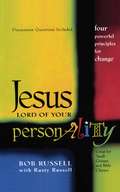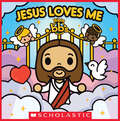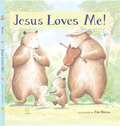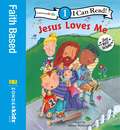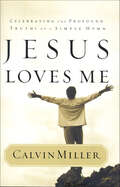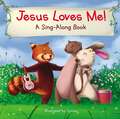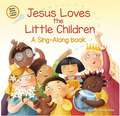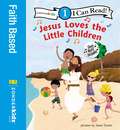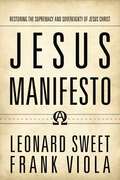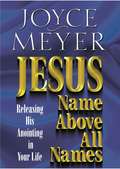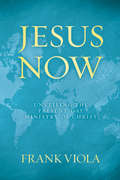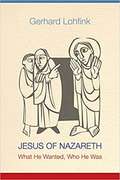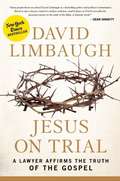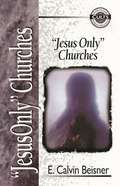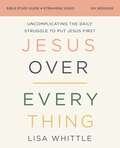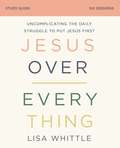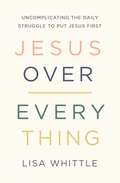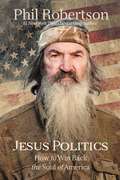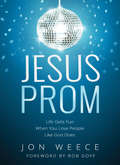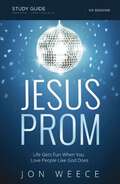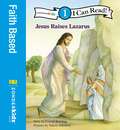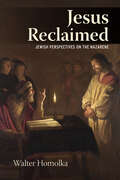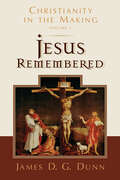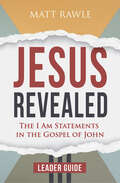- Table View
- List View
Jesus Lord of Your Personality
by Bob Russell Rusty RussellBob Russell, pastor of the 22,112-member Southeast Christian Church in Louisville, Kentucky, and author of When God Builds a Church, presents four powerful principles that will shape and sculpt your personality to be more like Christ's. In this profound book, Russell and his son, Rusty, deliver answers to four problem areas of our personalities that keep us from becoming what God wants us to be. Using biblical studies, contemporary illustrations, and practical teaching, the Russells help us move from being gripy to being grateful, from being filled with worry to being filled with peace, from bitterness to forgiveness and from depression to joy. The material in this book is perfect for small groups, Sunday school classes, or a motivational sermon series. Whether you are a student, teacher, professional, or parent, you will find this book life changing and richly rewarding.
Jesus Loves Me (Bible bb's)
by ScholasticLet the Bible bb's share the love of Jesus in this adorable storybook adaptation of the favorite Sunday School song, "Jesus Loves Me."The Bible bb's share the Good News about Jesus using the beloved children's song "Jesus Loves Me." With adorably fun, yet reverent artwork depicting key moments in Jesus' ministry featured on each spread, introduce your child to the heart of the Gospel with this sing-along storybook!Bible bbs: Timeless Bible stories for a whole new generation!
Jesus Loves Me: A Lifetime Of Walking With Jesus (I Can Read! #Level 1)
by ZondervanVerse by verse, this level-one reader shows how much Jesus loves children. Jesus Loves Me uses whimsical illustrations, music, and reading to make this much-loved children’s song come to life. Simple sheet music is included so that parents or teachers can play the melody while children read and sing along. Jesus Loves Me is part of the I Can Read™/Song Series.
Jesus Loves Me: Celebrating the Profound Truths of a Simple Hymn
by Calvin MillerThere are few songs more recognizable to the Christian believer than Anna B. Warner's beloved hymn, "Jesus Loves Me." The simple yet eloquent lyric states the basic elements of faith both plainly and succinctly; within the three title words are found the tenets of Christianity. Now, by examining this beloved hymn verse by verse, including the little known second and third stanzas, Calvin Miller seeks to remind believers of the clear and abiding truths found within this child's rhyme. In doing so, he establishes the song as a creed by which busy Christian adults can live and grow.
Jesus Loves Me: Level 1 (A Sing-Along Book)
by ZondervanRead or sing along with your little one&’s favorite song! Jesus Loves Me pairs sweet, snuggly illustrations with the text of the familiar children&’s song. This newest board book in the beloved Sing-Along series also features a padded cover perfect for little hands, and is sure to delight children and parents alike.
Jesus Loves the Little Children: Level 1 (A Sing-Along Book)
by ZondervanRead or sing along with your little one&’s favorite song! Jesus Loves the Little Children pairs adorable illustrations by Elina Ellis with the lyrics of the beloved children&’s song. This newest board book in the popular Sing-Along series also features a padded cover perfect for little hands, music notes and lyrics on the final page, and interactive content that&’s sure to delight children and parents alike.Jesus loves the little children, all the children of the world.Fast and funny, bold and bright, all are precious in his sight. Jesus loves the little children of the world.
Jesus Loves the Little Children: Level 1 (I Can Read! #Level 1)
by Various AuthorsChildren will discover just how much Jesus loves them when they read and sing along with Jesus Loves the Little Children. By combining the words to each verse, a song sheet with the melody line, and adorable illustrations, this level-one reader will be a joy to children and/or parents and teachers alike. Jesus Loves the Little Children is part of the I Can Read™ /Song Series.
Jesus Manifesto: Restoring the Supremacy and Sovereignty of Jesus Christ
by Leonard Sweet Frank ViolaJesus Manifesto presents a fresh unveiling of Jesus, seeking to restore the supremacy and sovereignty of Christ in a world—and a church—that has lost sight of Him.Christians have made the gospel about so many things—things other than Christ. Religious concepts, ideas, doctrines, strategies, and methods that begin to eclipse the beauty, the glory, and the reality of the Lord Jesus Himself.We know a lot about our Lord, but we don't know Him very well. We know a lot about trying to be like Jesus, but very little about living by His indwelling life. Jesus Manifesto provides clarity on the most important points of our faith. It is a prophetic call to restore the supremacy and sovereignty of Christ in a world and church that has lost sight of Him.This manifesto emphasizes ten crucial areas of restoring the supremacy of Jesus Christ, noting:Christians don&’t follow Christianity; they follow ChristChristians don't proclaim themselves; they proclaim ChristChristians don&’t point people to core values; they point people to the CrossChristians don't preach about Christ; they preach ChristRead this book to see your Lord like you've never seen Him before and restore the sovereignty of Jesus in your life.
Jesus Name Above All Names: Releasing His Anointing in Your Life
by Joyce MeyerPeople are healed in the Name, saved in the Name, baptized in the Holy Spirit in the Name-there is Power in the Name of Jesus! But why, then, are so many Christians living a powerless life? "It's not because His glorious Name is not powerful," asserts bestselling author Joyce Meyer. "It's because we lack true faith in Jesus' Name!" Joyce leads you into the throne room to discover the majesty and wonder found at the right hand of the Father. Learn how faith is a force and how the power of the Holy Spirit that lives in you as a Christian can be released through prayer. Jesus said, "...'All authority has been given to Me in heaven and on earth'" and "If you ask anything in My name, I will do it" (Matthew 28:18; John 14:14 NKJV). Jesus gave us His Name to use when we ask in line with His will. Life transforming? You can expect nothing less from the Giver of all things new. Discover how to release God's power in your life today, and accomplish great things through Jesus-Name Above All Names!
Jesus Now
by Frank ViolaDuring His ministry on earth, Jesus of Nazareth spent most of His time healing the sick, casting out demons, training disciples, teaching the people, and preaching the kingdom of God. But what is Jesus Christ doing today? What is His present-day ministry?In Jesus Now, bestselling author Frank Viola gives us the first comprehensive treatment of what Jesus has been doing since His ascension until His second coming. In an easy-to-read format, Viola explores the seven aspects of Christ's ministry today and shows how each one benefits the saved and the unsaved. Open these pages and discover what the Lord Jesus Christ is doing now and how it will impact your life.
Jesus Of Nazareth: What He Wanted, Who He Was
by Linda M. Maloney Gerhard LohfinkWho was Jesus? A prophet? There have been many of those. A miracle-worker? A radical revolutionary? A wise teacher? There have been many of these, too. In his latest book, renowned Scripture scholar Gerhard Lohfink asks, What is unique about Jesus of Nazareth, and what did he really want? <P><P> Lohfink engages the perceptions of the first witnesses of his life and ministry and those who handed on their testimony. His approach is altogether historical and critical, but he agrees with Karl Barth's statement that "historical criticism has to be more critical." <P><P> Lohfink takes seriously the fact that Jesus was a Jew and lived entirely in and out of Israel's faith experiences but at the same time brought those experiences to their goal and fulfillment. The result is a convincing and profound picture of Jesus.
Jesus On Trial: A Lawyer Affirms The Truth Of The Gospel
by David LimbaughNew York Times Bestseller! <P> In Jesus on Trial, David Limbaugh applies his lifetime of legal experience to a unique new undertaking: making a case for the gospels as hard evidence of the life and work of Jesus Christ. Limbaugh, a practicing attorney and former professor of law, approaches the canonical gospels with the same level of scrutiny he would apply to any legal document and asks all the necessary questions about the story of Jesus told through Matthew, Mark, Luke, and John. His analysis of the texts becomes profoundly personal as he reflects on his own spiritual and intellectual odyssey from determined skeptic to devout Christian. Ultimately, Limbaugh concludes that the words Christians have treasured for centuries stand up to his exhaustive inquiry-including his examination of historical and religious evidence beyond the gospels-and thereby affirms Christian faith, spirituality, and tradition.
Jesus Only Churches
by E. Calvin Beisner Alan W. GomesUnlike Jehovah's Witnesses, who deny the Trinity by demoting Jesus to a mere man, the "Jesus Only" churches deny the Trinity by claiming that there is only one God, and that Jesus is the Father and the Holy Spirit. "Jesus Only" churches not only require baptism for salvation, but also stipulate that it must be baptism in the name of the Lord Jesus Christ only, and not in the name of the Father, the son, and the Holy Spirit. Thus, these churches distort the gospel and the historic, orthodox understanding of Jesus. Why this series? This is an age when countless groups and movements, old and new, mark the religious landscape in our culture, leaving many people confused or uncertain in their search for spiritual truth and meaning. Because you may not have the time or opportunity to research these movements fully, these books provide essential and reliable information and insights for their spiritual journeys. The second wave of books in this series addresses a broad range of spiritual beliefs, from non-Trinitarian Christian sects to witchcraft and neo-paganism to classic non-Christian religions such as Buddhism and Hinduism. All books but the summary volume, Truth and Error, contain five sections: -A concise introduction to the group being surveyed -An overview of the group’s theology — in its own words -Tips for witnessing effectively to members of the group -A bibliography with sources for further study -A comparison chart that shows the essential differences between biblical Christianity and the group -Truth and Error, the last book in the series, consists of parallel doctrinal charts compiled from all the other volumes. Three distinctives make this series especially useful to readers: -Information is carefully distilled to bring out truly essential points, rather than requiring readers to sift their way through a sea of secondary details. -Information is presented in a clear, easy-to-follow outline form with “menu bar” running heads. This format greatly assists the reader in quickly locating topics and details of interest. -Each book meets the needs and skill levels of both nontechnical and technical readers, providing an elementary level of refutation and progressing to a more advanced level using arguments based on the biblical text. The writers of these volumes are well qualified to present clear and reliable information and help readers to discern truth from falsehood.
Jesus Our Guide: Faith & Life Series (Third Edition)
by Ignatius PressThe aim of the book is to help the fourth graders to learn the purpose of life through the scriptures as it puts into use the four principal parts of catechisms: the Commandments, the Creed, the Prayer and Scripture, Sacraments and Liturgy
Jesus Over Everything Bible Study Guide plus Streaming Video, Updated Edition: Uncomplicating the Daily Struggle to Put Jesus First
by Lisa WhittleHow your life becomes less complicated and more mindful when you put Jesus first.Every reference in the Bible to a healthy spiritual life is dependent on putting God first. But there are a lot of things that can get in the way of that ultimate priority--from over-working to over-thinking. Many times, our lives get complicated before we know it. Most of us don't willfully choose this; we silently slide into it.In this six-week study (video access included), Lisa Whittle helps you build up defenses against damaging thought patterns and learn to reorder your priorities to consistently put Jesus back on top.Jesus Over Everything is a close look at the Jesus-first life and the better things it offers. Filled with biblical examples and practical guidance, the journey ahead will unpack eight choice statements that will encourage new daily lifestyle decisions:Real over prettyLove over judgementService over spotlightSteady over hypeHonesty over hidingPacked with practical application and tools to equip and motivate you, the Jesus-over-everything journey will help you reprioritize your faith first in order to reprioritize your daily life.This study guide has everything you need for a full Bible study experience, including:The study guide itself--with discussion and reflection questions, Scripture reading, video notes, and a leader's guide.An individual access code to stream all six video sessions online (you don't need to buy a DVD!).Sessions and video run times:Putting God First (16:00)Being Real (17:00)Serving People (17:00)Remembering What&’s True (15:30)Changing Your Heart (22:00)Walking It All Out (17:00)Watch on any device!Streaming video access code included. Access code subject to expiration after 12/31/2026. Code may be redeemed only by the recipient of this package. Code may not be transferred or sold separately from this package. Internet connection required. Eligible only on retail purchases inside the United States. Void where prohibited, taxed, or restricted by law. Additional offer details inside.
Jesus Over Everything Study Guide: Uncomplicating the Daily Struggle to Put Jesus First
by Lisa WhittleDo you long to know what a truly transformed life really feels like?Do you want to?Every reference to transformation and a healthy spiritual life in Scripture is dependent on putting God first, so what's the problem? Often times our human struggle is rooted in our priorities and where Jesus lands on our laundry list of considerations. Regardless of what we know to be true, our actions do not reflect the truth and virtue that Christ promises when we choose to put him first.Author, Bible teacher, and ministry leader Lisa Whittle challenges us to put Jesus over everything- from simple to complex circumstance, heart to head understanding, in everyday application and see what really happens. Because only when He is first do we know what a truly transformed life feels like. Lisa puts practical language to our universal difficulties, offering hope and direction for the future ahead.Jesus Over Everything is a compelling picture of what Jesus followers both crave and struggle to define as we seek to give God His rightful place in our everyday lives.In this six-week study (DVD/video downloads sold separately), women will learn the tools to live with spiritual consistency, break damaging thought patters, find greater motivation to take care of the same things that break Jesus' heart in their everyday lives, gain applicable insight into everyday issues and responses, and have a clear understanding of how much better life is when God is the priority, right now.Designed for use with Jesus Over Everything Video Study (sold separately).
Jesus Over Everything: Uncomplicating the Daily Struggle to Put Jesus First
by Lisa WhittleIn Jesus Over Everything, Lisa Whittle gives practical language for our universal difficulties, offering hope and direction for the future.As Christian women, we desire to put Jesus first. We want to prioritize him above all, knowing instinctively that when we do, everything else in our lives will fall into alignment. Yet life feels complicated, and the demands of our daily lives leave our priorities out of order and our hearts longing for more.Author, speaker, and Bible teacher Lisa Whittle is passionate about helping people pursue Jesus for life, grow deep roots of faith, and walk strong in a world that so often seems to have gone crazy. In Jesus Over Everything, Lisa shares eight statements of choice to help us grow in our understanding of what it means to put Jesus first amid the craziness our days bring, including choices such ascommitment over mood,steady over hype,holiness over freedom,service over spotlight,and more.Jesus Over Everything is a practical, compelling picture of what we crave yet struggle to define as we seek to give God his rightful place in our everyday lives.
Jesus Politics: How to Win Back the Soul of America
by Phil RobertsonNew York Times bestselling author and Duck Dynasty star Phil Robertson exposes the destructive nature of American politics and calls on Christians to actively participate in advancing the Kingdom of heaven on earth.We live in an ever-dividing country, a country in which identity politics, creeping socialist policies, and the vast partisan divide threaten the very fabric of America. After decades of political decay and of losing sight of our first principles, the American people are suffering from runaway debt, increased rates of depression, broken families, moral decay, and more. In Jesus Politics, Phil Robertson provides an alternate path: a radical call for Christians to use their freedoms to advance the agenda of the King and win back the soul of America.Exploring the problems facing our country and how Jesus would respond to each, Robertson offers a manifesto, showing us how to do good by King Jesus, bringing the kingdom of heaven to our homes, neighborhoods, churches, communities, and country. Jesus Politics charges readers to use their time, talents, resources, influence, and votes to protect and advance the policies of King Jesus. Together, Robertson declares that we can win back the soul of America, becoming a nation that proclaims, "In the King we trust."
Jesus Prom
by Jon WeeceJesus loves people. Wouldn't it make sense that thosewho claim to love Jesus would love the same people Jesus loves? Nouns need verbs, a requirement that'smore than just a grammatical truth; it's a spiritual truth. The noun Christianand the noun church require action verbs to fulfill their purpose.That's why Jesus invites Christians and churches everywhere to perform thegreatest action of all: loving people.Jesus Prom is an extravagant party that celebrates the very people Jesus died tolove. You will laugh and cry as you move through the pages of this book, and bythe end of it, you'll want to join the dance.
Jesus Prom Study Guide: Life Gets Fun When You Love People Like God Does
by Jon WeeceJesus loved verbs. He loved action words such as live, come, rest, learn, hear, give, go and even die. So wouldn't it make sense that the people who claim to follow Jesus would love the same words that Jesus loved?Unfortunately, somewhere along the way someone tried to make the word "Christian" an adjective. So now people speak of "Christian" books and "Christian" music and "Christian" schools. When people use the word "Christian" as an adjective instead of a noun, it loses its meaning. Maybe this explains why so many churches have lost their purpose.In Jesus Prom, Jon Weece explains how our goal as Christians is to become increasingly more like Jesus. Jesus loved people, which means we should love people. We don't "kind of" love people--we love them the way Jesus loves us. We impersonate his every move. If imitation is the greatest form of flattery, Jesus should be flattered by the actions of his Church. This study guide includes discussion questions, video notes, and in-between studies and is designed for use with Jesus Prom: A DVD Study (sold separately).
Jesus Raises Lazarus: Level 1 (I Can Read! #Level 1)
by Crystal BowmanChristian parents especially appreciate books for their young readers that help them understand more about God. Reading the Bible can be a very overwhelming challenge for young readers. Therefore, Bible stories written in a learn-to-read format are a welcomed product. This is the idea behind the proposal Bible Stories for I Can Read! Level1. When interesting stories from the Bible are written with on-level vocabulary, the child gains knowledge of Scripture and biblical truths while developing his or her reading skills. The result is a meaningful and positive reading experience for the child. Possible titles include: Old Testament: Twelve Special Stones, The Life of Samuel, Elijah and Ahab at Mt. Carmel (1 Kings 18), The Healing of Naaman (2 Kings 5), New Testament: The Two Sons, Jesus Feeds 5000 (Matthew 14, Mark 6, John 6), Lazarus Rises from the Dead (John 11), Jesus Walks on Water (Matthew 14), Saul’s Conversion (Acts 9)
Jesus Reclaimed: Jewish Perspectives on the Nazarene
by Rabbi Walter HomolkaAfter centuries of persecution, oppression, forced migrations, and exclusion in the name of Christ, the development of a Jewish “Quest for the Historical Jesus” might seem unexpected. This book gives an overview and analysis of the various Jewish perspectives on the Nazarene throughout the centuries, emphasizing the variety of German voices in Anglo-American contexts. It explores the reasons for a steady increase in Jewish interest in Jesus since the end of the eighteenth century, arguing that this growth had a strategic goal: the justification of Judaism as a living faith alongside Christianity.
Jesus Remembered: Christianity in the Making, Volume 1
by James D. DunnJames Dunn is regarded worldwide as one of today's foremost biblical scholars. Having written groundbreaking studies of the New Testament and a standard work on Paul's theology, Dunn here turns his pen to the rise of Christianity itself. Jesus Remembered is the first installment in what will be a monumental three-volume history of the first 120 years of the faith.Focusing on Jesus, this first volume has several distinct features. It garners the lessons to be learned from the "quest for the historical Jesus" and meets the hermeneutical challenges to a historical and theological assessment of the Jesus tradition. It provides a fresh perspective both on the impact made by Jesus and on the traditions about Jesus as oral tradition -- hence the title "Jesus Remembered." And it offers a fresh analysis of the details of that tradition, emphasizing its characteristic (rather than dissimilar) features. Noteworthy too are Dunn's treatments of the source question (particularly Q and the noncanonical Gospels) and of Jesus the Jew in his Galilean context.In his detailed analysis of the Baptist tradition, the kingdom motif, the call to and character of discipleship, what Jesus' audiences thought of him, what he thought of himself, why he was crucified, and how and why belief in Jesus' resurrection began, Dunn engages wholeheartedly in the contemporary debate, providing many important insights and offering a thoroughly convincing account of how Jesus was remembered from the first, and why.Written with peerless scholarly acumen yet accessible to a wide range of readers, Dunn's Jesus Remembered, together with its successor volumes, will be a sine qua non for all students of Christianity's beginnings.
Jesus Revealed Leader Guide: The I Am Statements in the Gospel of John
by Matt RawleDiscover Jesus' character through the "I Am" statements in Jesus Revealed by pastor and author Matt Rawle.Light. Bread. Shepherd. Life. The Gospel of John uses these and other symbols to paint a picture of who Jesus is. Through the I Am statements Jesus describes himself with rich images, showing us that he is both fully human and fully divine and calling us as his followers.In Jesus Revealed: The I Am Statements in the Gospel of John, author Matt Rawle explores the "I Am" statements in John as works of art that resonate throughout the Gospel and all of Scripture. He shows how these words point beyond themselves to the deep mystery of Jesus Christ. Join Matt on this journey and experience the profound truth at the heart of the "I Am" statements: that Jesus is light and life, and he calls us to himself and offers us the hope of resurrection. Chapter topics include:1. I am the bread of life (John 6:48)2. I am the light of the world (John 8:12)3. I am the good shepherd (John 10:11)4. I am the resurrection and the life (John 11:25)5. I am the way, the truth, and the life (John 14:6)6. I am the true vine (John 15:1)The Leader Guide contains everything needed to guide a group through the six-week study including session plans, activities, and discussion questions, as well as multiple format options.Praise for Jesus Revealed"Matt Rawle, the master of discerning connections between Christ and culture, turns now to explore with us how Jesus pioneered how to know the heart of God via the most basic icons of his own culture. Symbols in stories matter, and Matt guides us into Jesus’ with aplomb, wisdom, and joy."- James Howell, Senior Pastor, Myers Park United Methodist Church"Reading Jesus’ “I Am” statements in the Gospel of John can be mystifying, yet much like the gospel writer himself author Matt Rawle is able uncover a deeper meaning from these powerful metaphors. Jesus Revealed invites the reader to step into the ordinary work of God’s extraordinary creation. Calling out the artist within, readers will find their own stories inside these powerful declarations – illuminating a Jesus we’ve always known but perhaps never fully embraced. Jesus Revealed is a must-read for anyone ready to discover the inexhaustible experience of God’s profound love."- Rachel Billups, Pastor and Author of Be Bold: Finding Your Fierce
